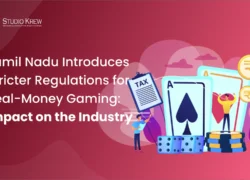Introduction: A Landmark Shift in Indian Gaming
The Indian gaming industry has always been dynamic — from the rise of cybercafes in the early 2000s to the smartphone-led gaming boom of the last decade. However, on August 20, 2025, the industry experienced its most significant disruption yet.
The Promotion and Regulation of Online Gaming Bill, 2025, was introduced in the Lok Sabha on August 20, a day after it received approval from the Union Cabinet on August 19. This will introduce a blanket ban on all real-money online games. Overnight, popular platforms offering fantasy sports, poker, rummy, and teen patti were declared illegal.
While the move sent shockwaves through the ecosystem, it is not the end of online gaming in India. Instead, it signals the beginning of a new chapter where skill games, casual gaming, and eSports will shape the future. To understand this transition, let’s break down what the new regulations mean and how the landscape is shifting.
What the Bill Really Says
The new law leaves little to no ambiguity. It goes beyond partial restrictions and imposes a complete prohibition on real-money gaming.
- Complete ban on real-money gaming
Whether based on chance (such as slots or roulette) or skill (like fantasy cricket or poker), if the game involves wagering or financial stakes, it is now prohibited. This creates a level playing field where no operator can claim exceptions. - Strict penalties for violators
Operators running real-money platforms risk up to three years in jail and fines of up to ₹1 crore. Even influencers and promoters endorsing such apps face a two-year prison term and fines of up to ₹50 lakh. This signals the government’s intent to not only curb operators but also cut off marketing pipelines. - Unprecedented enforcement powers
The bill authorizes agencies to conduct warrantless digital searches and seizures. This means platforms cannot rely on encryption or overseas hosting as shields. Regulators will have the power to block servers, override access controls, and shut down apps instantly. - Exemptions for safer play
Interestingly, the bill doesn’t demonize gaming itself. eSports, casual games, and non-monetized skill-based titles are specifically encouraged. The government is signaling: Gaming is welcome. Gambling disguised as gaming is not.
👉 For developers, this provides clarity that was missing for years. Instead of navigating state-by-state grey zones, India now has a national framework.
Who’s Hit the Hardest?
The ban is a death knell for platforms whose entire business models revolved around real-money stakes.
- Fantasy sports operators
Companies like Dream11 and MPL, once considered unicorn success stories, face existential risks. Fantasy cricket had become synonymous with online gaming in India, but with wagers banned, its core revenue streams have been eliminated. - Poker, rummy, and casino apps
Traditional card and casino platforms, which thrived on real-money entry fees and buy-ins, are directly outlawed. Their player bases — once numbering in the millions — now have no legal way to engage. - Influencers and promoters
A significant portion of India’s gaming influencer economy was tied to affiliate marketing through these platforms. From Instagram Reels promoting fantasy cricket to YouTube poker tutorials, this ban effectively collapses a revenue stream for content creators as well.
📉 Analysts estimate the potential ban on India’s real-money gaming (RMG) industry in the government’s draft online gaming bill could deliver a severe setback to the Indian economy, ₹25,000 crore in annual tax revenues, and put roughly 2 Lakh jobs at risk across gaming, fintech, and marketing sectors directly or indirectly. *source MoneyControl
The Silver Lining: What’s Still Allowed (and Growing Fast)
While the headlines scream “Ban!”, the fine print reveals a huge opportunity for developers and players.
1. Skill Games
Puzzle-based games, trivia, and educational apps that rely solely on player ability are exempt from the law. This opens doors for:
- EdTech gamification: Imagine math quizzes with leaderboards or corporate training apps designed as RPGs.
- Trivia and brain-training apps: Engaging younger audiences and adults alike.
- Gamified recruitment: Companies assessing candidates via mini-games that test logic and decision-making.
👉 StudioKrew’s LMS game development services are already aligning with this space — helping enterprises use gamified learning platforms to engage employees in meaningful, skill-driven play.
2. Casual Games
Casual gaming is now the true mass-market winner. These are games that anyone can play in a few taps, without financial risk:
- Endless runners (Subway Surfers, Temple Run)
- Match-three puzzles (Candy Crush)
- Cricket or Bollywood-inspired mini-games
- Offline Games or Mini-Games (Challenge Master)
Their monetization model? Ads, in-app purchases, and subscriptions — not gambling. This makes them government-friendly and consumer-friendly.
👉 At StudioKrew, we see casual games as the perfect pivot for startups previously in the real-money space.
3. eSports
eSports is the biggest long-term winner. With recognition as a legitimate industry, expect:
- University-level tournaments
- Franchise-based eSports leagues (like IPL but for gaming)
- Rising demand for streaming infrastructure
For young players, eSports could soon become a viable career path — something real-money gaming never could be.
What’s Next for Developers and Investors?
The smartest players in the ecosystem won’t exit; they’ll pivot. While developers must rethink their design and engagement strategies, investors now face a critical decision: stay sidelined or reallocate capital into the next wave of Indian gaming growth.
1. Gamified Enterprise Apps
- For developers: EdTech, recruitment, and corporate training platforms are ripe for gamification. Imagine a bank training its workforce through mini-game simulations, or an FMCG giant assessing sales candidates with gamified psychometric tests.
- For investors, these B2B SaaS-driven models offer recurring revenue and are less susceptible to sudden policy shifts. Case in point: in the US, gamified training startups like Kahoot! saw valuations soar by focusing on education and enterprises, not consumer gambling.
2. Free-to-Play Social Games Inspired by Real-Money Mechanics
- For developers: Formats like poker, rummy, or fantasy leagues don’t need to disappear — they need to evolve. A PPPoker-style casual platform with tournaments, leaderboards, and skins creates the thrill of competition without money stakes.
- For investors: This is a proven model globally. In China, following online poker bans, companies pivoted to “free-to-play poker clubs” that monetized in-app items. These models retained millions of users and attracted advertisers, maintaining strong revenues without violating laws.
👉 At KrewGames, our in-house studio, we’re already building such a casual PPPoker-style platform, designed to replicate the social fun of real-money gaming while being 100% free and compliant with India’s new regulations.
3. Localized Intellectual Property (IP)
- For developers: India is ready for content rooted in its own culture. Cricket simulations, mythological RPGs, and festival-themed casual games will likely resonate more with players than Western imports.
- For investors: Think long-term. Owning IP isn’t just about downloads — it unlocks franchise potential, licensing, and merchandise. The success of Chinese studios building games around folklore (like Honor of Kings) proves how localized IP can scale globally.
4. eSports Ecosystem
- For developers: With eSports now explicitly promoted under the bill, this is the moment to build competitive-ready multiplayer titles, streaming platforms, and event tech.
- For investors: Globally, investors have already shifted their focus toward eSports as a safer investment option post-regulation. In South Korea, for example, government restrictions on gambling coincided with the explosive growth of eSports, creating billion-dollar ecosystems around League of Legends and StarCraft.
In India, a similar trajectory is now possible — not just in gaming, but across sponsorships, media rights, and infrastructure startups that support tournaments.
5. AR/VR and Mixed Reality Experiences
- For developers: AR/VR game development is no longer an experimental endeavor. From VR cricket simulators to AR treasure hunts, the potential is huge.
- For investors: Globally, AR/VR is emerging as the next growth magnet. In the US, Meta invested billions in VR ecosystems; in Japan, mixed reality arcades flourished after pachinko restrictions were lifted. India is now poised for a similar shift, particularly as affordable headsets become available on the market.
6. Safety-First, Regulated Platforms
- For developers: Expect demand for compliance-first ecosystems — platforms that integrate parental controls, age gates, and clear anti-addiction mechanisms.
- For investors: In Europe, investors redirected gaming capital toward regulation-aligned platforms following the 2018 gambling crackdowns. Those who invested early in transparent, compliance-first companies saw longer sustainability and higher valuations than those chasing risky bets.
🔑 Key Takeaway for Investors
India’s gaming reset mirrors global trends observed in China, South Korea, and Europe, where gambling restrictions have forced ecosystems to mature in healthier, more sustainable ways. For investors, this presents an opportunity to get in early on India’s second wave of gaming growth — one driven by casual games, skill-based experiences, and eSports infrastructure.
Final Thoughts: A Reset, Not an End
The Promotion and Regulation of Online Gaming Bill, 2025, is not just a ban — it’s a reset button for India’s gaming ecosystem. By removing the gambling-heavy layer, the government has cleared the path for skill-driven, entertainment-first, and globally competitive gaming models.
- For gamers → Safer, more creative, and more social experiences that go beyond money-driven addiction loops.
- For developers → A chance to innovate in casual, AR/VR, and eSports spaces that can scale both in India and globally.
- For investors → A historic opportunity to back the next wave of sustainable gaming startups. Just as China’s ban on gambling titles gave rise to Honor of Kings, or South Korea’s regulatory push turned it into an eSports superpower, India, too, stands at the cusp of a renaissance moment.
At StudioKrew, we believe the future of Indian gaming isn’t about luck — it’s about skill, creativity, and community. With expertise in casual game development, gamified enterprise solutions, and eSports-ready platforms, we are committed to helping both developers and investors navigate this transition and seize the opportunities it creates.
The ban may feel like an ending, but in reality, it’s the beginning of India’s true gaming revolution.




